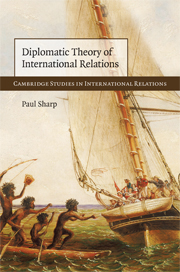Book contents
- Frontmatter
- Contents
- Acknowledgements
- Introduction
- Part I Traditions of international thought and the disappointments of diplomacy
- Part II Elements of a diplomatic tradition of international thought
- Part III Diplomatic understanding and international societies
- Part IV Thinking diplomatically about international issues
- Conclusion
- Bibliography
- Index
- Cambridge Studies in International Relations
- References
Bibliography
Published online by Cambridge University Press: 05 June 2012
- Frontmatter
- Contents
- Acknowledgements
- Introduction
- Part I Traditions of international thought and the disappointments of diplomacy
- Part II Elements of a diplomatic tradition of international thought
- Part III Diplomatic understanding and international societies
- Part IV Thinking diplomatically about international issues
- Conclusion
- Bibliography
- Index
- Cambridge Studies in International Relations
- References
- Type
- Chapter
- Information
- Diplomatic Theory of International Relations , pp. 312 - 333Publisher: Cambridge University PressPrint publication year: 2009



